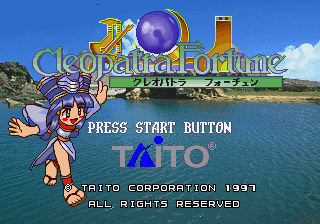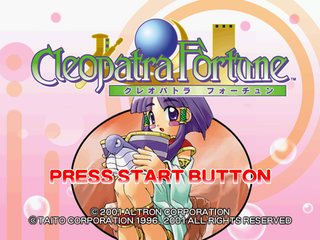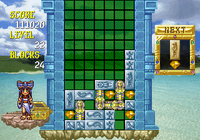Cleopatra Fortune
From Sega Retro
| |||||||||||||||
| Cleopatra Fortune | |||||||||||||||
|---|---|---|---|---|---|---|---|---|---|---|---|---|---|---|---|
| System(s): Sega Saturn, Sega Dreamcast | |||||||||||||||
| Publisher: Taito Altron | |||||||||||||||
| Developer: Taito Natsume | |||||||||||||||
| Licensor: Taito | |||||||||||||||
| Original system(s): Taito F3 System | |||||||||||||||
| Developer(s) of original games: Taito | |||||||||||||||
| Sound driver: SCSP/CD-DA (13 tracks) | |||||||||||||||
| Peripherals supported: Dreamcast VGA Box, Visual Memory Unit Saturn Backup Memory | |||||||||||||||
| Genre: Action Puzzle[1], Puzzle[2][3][4][5] | |||||||||||||||
| Number of players: 1-2 | |||||||||||||||
| |||||||||||||||
|
Cleopatra Fortune (クレオパトラフォーチュン) is a 1997 puzzle game for arcades ported to the Sega Saturn, PlayStation, and Sega Dreamcast systems, created by Taito in association with Natsume. It was only ever released on Sega systems in Japan.
The game utilizes an Egyptian theme. Its name comes from its mascot, Patrako (パトラ子), a young Egyptian princess who resembles the ancient queen Cleopatra and cheers the player on.
Contents
Gameplay
The game is a falling block puzzle game similar to Tetris. Pieces containing stone blocks, mummies, sarcophagi, and gems fall into a well, and the player must organize them to create closures. If the mummies, sarcophagi, and gems are completely enclosed by stone blocks and the sides of the well, they are eliminated and the player gains points. If a full line of stone blocks is formed, they disappear in a similar fashion to Tetris and also add to the player's score. Whenever blocks disappear, the remaining pieces fall and reshuffle under the effect of gravity, which can be used to create chain reactions that award more points. Blocks taking up two spaces are not split into smaller pieces when pieces are reshuffled. The game ends if the well fills and the player can no longer place additional pieces. The player receives a "Perfect" bonus if every block in the well is eliminated.
There is a single-player endless mode where the player tries to accumulate the highest score possible and a two-player competitive mode where eliminating lines sends additional lines to the bottom of the other player's well. There is also a single-player Mystery (ミステリー) mode where the player must clear prearranged fields in specific ways. This mode has story cutscenes in between puzzles. There are 100 different puzzles (broken into two halves comprising 50 puzzles each). The Dreamcast version additionally has a Time Attack (タイムアタック) mode.
Pieces are moved with ![]() or
or ![]() . They can be dropped faster by holding
. They can be dropped faster by holding ![]() . In the Saturn version, pieces can be rotated clockwise with
. In the Saturn version, pieces can be rotated clockwise with ![]() or
or ![]() and cannot be rotated counterclockwise. In the Dreamcast version, pieces can be rotated clockwise with
and cannot be rotated counterclockwise. In the Dreamcast version, pieces can be rotated clockwise with ![]() and counterclockwise with
and counterclockwise with ![]() .
.
Blocks
| Stone Block | |
|---|---|
| Stone blocks fall from the top of the well. They can enclose other blocks to eliminate them. Forming a line of stone blocks eliminates the entire line. | |
| Gem | |
| Gems fall with stone blocks. They are eliminated by enclosing them within stone blocks and the sides of the well. | |
| Sarcophagus | |
| Sarcophagi fall with stone blocks. They are larger than gems. They are eliminated by enclosing them within stone blocks and the sides of the well. | |
| Mummy | |
| In single-player matches, mummies fall with stone blocks in the later levels. In two-player matches, they appear pre-placed in the well at the start and also rise from the bottom of the well, along with stone blocks, as the opposing player eliminates lines. They are eliminated by enclosing them within stone blocks and the sides of the well, but they must also be enclosed with treasure (gems or sarcophagi). | |
| Pyramid | |
| Eliminates all blocks of the type that it lands on. Appears randomly in rare instances. |
History
Release
The game was initially released in late 1995 for the Taito X-55, a home karaoke machine that was able to download music and games over a phone line. An arcade port was released the following year, followed by a PlayStation version and a Sega Saturn version that were released in Japan, along with a Dreamcast version in 2001. The PlayStation and Dreamcast versions were developed by Altron and feature redrawn graphics and a remixed soundtrack. A PlayStation version was released in North America and Europe in 2003.
Legacy
An arcade-only sequel called Cleopatra Fortune Plus was released later in 2001 on the Sega NAOMI system. Both the Dreamcast port and this new sequel were created in association with Altron instead of Natsume.
The original arcade game was included in Taito Memories Joukan for the PlayStation 2 in 2005 and Taito Legends 2 for the PlayStation 2, Xbox, and Windows PCs in 2006.
A port published by City Connection and based on the Saturn version titled Cleopatra Fortune S-Tribute was released for PlayStation 4, Xbox One, Nintendo Switch, and Steam in 2022.
Versions
Comparisons
- Main article: Cleopatra Fortune/Comparisons.
Production credits
Saturn version
- Game Design: FJT, Ohhara Kazuhiro, S.N, Takaoka (Natsume)
- Software Design: T:Oku (Natsume), Moriyuki Kanaya (Natsume)
- Charactor Design: Y.Kousokabe, I.Inoue (Natsume), Kana Hirano (Natsume), Oppai Kawai (Natsume)
- Sound: Shu Nakazawa (Zuntata), C.Haggy (Zuntata), Kurahashi (Natsume)
- Voice: Rimmy (Zuntata), Ami
- Narration: Mika Twining
- Design: Naoto Hasizume
- Special Thanks: Yuji Iwasaki, Seiji Kawakami, Keppel Maekawa, PPR Kaito, T.Saito, Uoocky Maeda, K.Ishida, Tabby, Isao Ooyama, Harumi.K, Nob, Midori.T, Hiroyuki Maruyama, Hitoshi Kozuka, Mitsuhiro.T, Athushi Horimizu, Yukiko Shimbo, Masakazu Takeda, Takashi Yokouchi, Norikatsu Fukuda, Yosuke Tsuda, Yasuhiro Noguchi, Katsumi Kaneoka, Kazunari Ishida, Iku Mizutani (Natsume), Kimio Hirota (Natsume), Masahiro Iwasa (Natsume), Nobuhiro Koyama, Eiji, Kawabata, Norio Kabasawa, Norio Nakajima, HM All Staff, TG All Staff
- Producer: Masaki Ogata, Yoshihisa Nagata, Yoshio Imamura
- Presented by Taito
Magazine articles
- Main article: Cleopatra Fortune/Magazine articles.
Physical scans
Saturn version
| Sega Retro Average | |||||||||||||||||||
|---|---|---|---|---|---|---|---|---|---|---|---|---|---|---|---|---|---|---|---|
|
| 69 | |
|---|---|
| Based on 3 reviews | |
Dreamcast version
| Sega Retro Average | ||||||||||||||
|---|---|---|---|---|---|---|---|---|---|---|---|---|---|---|
|
| 67 | |
|---|---|
| Based on 2 reviews | |
Technical information
- Main article: Cleopatra Fortune/Technical information.
External links
- Sega of Japan catalogue pages (Japanese): Dreamcast
References
- ↑ File:CleopatraFortune Saturn JP Box Back.jpg
- ↑ 2.0 2.1 https://sega.jp/fb/segahard/ss/soft_licensee3.html (Wayback Machine: 2019-07-28 12:30)
- ↑ File:CleopatraFortune DC JP BoxBack.jpg
- ↑ 4.0 4.1 4.2 http://sega.jp/dc/010608/ (Wayback Machine: 2014-08-02 20:11)
- ↑ https://sega.jp/history/hard/dreamcast/software_l.html#tab02 (Wayback Machine: 2020-02-01 22:57)
- ↑ Saturn Fan, "1997 No. 3" (JP; 1997-01-31), page 179
- ↑ Sega Saturn Magazine, "1997-04 (1997-02-21)" (JP; 1997-02-07), page 144
- ↑ Sega Saturn Magazine, "Readers rating final data" (JP; 2000-03), page 12
- ↑ Dorimaga, "2001-02 (2001-06-08)" (JP; 2001-05-25), page 37
- ↑ Dorimaga, "2002-18 (2002-10-11)" (JP; 2002-09-27), page 34
| Cleopatra Fortune | |
|---|---|
|
Main page | Comparisons | Hidden content | Magazine articles | Reception | Technical information | |
- Saturn Backup Memory-compatible games
- Dreamcast VGA Box-compatible games
- Visual Memory Unit-compatible games
- 1-2 player games
- JP Saturn games
- All JP games
- Saturn games
- 1997 Saturn games
- All 1997 games
- Saturn puzzle games
- All puzzle games
- JP Dreamcast games
- Dreamcast games
- 2001 Dreamcast games
- All 2001 games
- Dreamcast puzzle games
- All games
- Credits without reference
- Cleopatra Fortune










